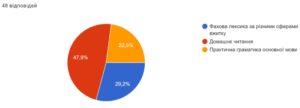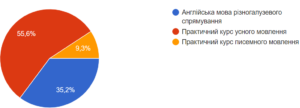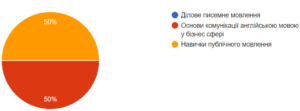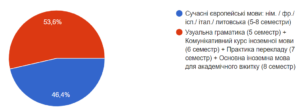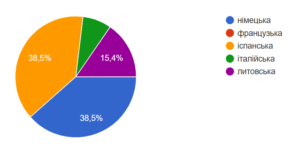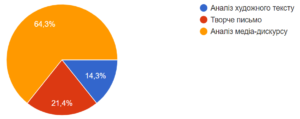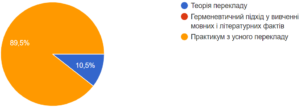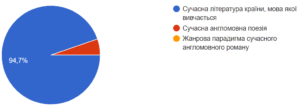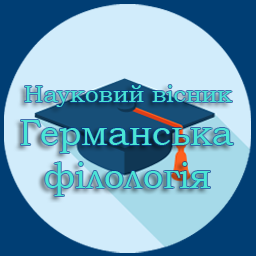Дисципліни вільного вибору
Результати вибору: списки студентів Вибіркові дисципліни 2023_2024 нр
Спеціальність: 035 Філологія
Cпеціалізація “035.041 Філологія (Германські мови та літератури (переклад включно))”
Освітня програма: Англійська мова і література та друга іноземна мова
Курс 1 Семестр 2 Навчальний рік 2023-2024 н.р.
| Вибірковий блок дисциплін (3 кредити, 90 год: 30 год практичні, 60 год самостійна робота, залік заочне – 90 год: 8 год практичні, 82 год.самост.робота) | |
| Практична граматика англійської мови
Викладач: асист. Буртник Б.Я. A Practical Grammar Course explains the structure of the English language. This course explains the fundamental ideas of grammar study to 1st-year students who require a deeper understanding of English grammar. In this regard, the current course serves as an introduction to the English grammar system through fundamental descriptions of the parts of speech and their morphological characteristics. The goal of this course is to provide a useful explanation of English grammar. To achieve this, the course blends theory and practice to enhance students’ understanding of the key grammatical concepts and make it easier for them to use the tools needed to conduct morphological analysis. Naturally occurring passages of written and spoken language from various contexts and discourse kinds are used to demonstrate the grammatical concepts that are being given. In conclusion, it is primarily designed to serve as a 1st-year grammar course for undergraduate English linguistics students. Its main aim is to assist these students in gaining a fundamental understanding of the English language’s structure and, ideally, to motivate them to continue their study of grammar at a deeper level.
|
Домашнє читання
Викладач: к.ф.н., асист. Федич Г.Д. Навчальна дисципліна «Домашнє читання» на 1 курсі спеціальності філологія належить до блоку вибіркових дисциплін і сприяє розвитку рецептивних та продуктивних вмінь студентів з метою досягнення рівня володіння мовою В2 згідно із Загальноєвропейськими Рекомендаціями з мовної освіти, систематизації практичних та теоретичних знань з англійської філології. Домашнє читання спрямоване на ознайомлення студентів із класичною автентичною літературою англійських та американських авторів, розвиток у майбутнього вчителя іноземної мови високої культури читання, покращення навичок читання, розуміння та інтерпретації оригінального тексту, що стимулює самостійність мислення, спонукає до ініціативного мовлення, в якому студенти вчаться відображати свої суб’єктивні погляди, інтереси та життєву позицію.
|
| Фахова лексика за різними сферами вжитку
Викладач: асист. Вітвіцька Н.М. Вивчення дисципліни «Фахова лексика за різними сферами вжитку вжитку» передбачає опанування студентами іншомовної фахової термінології та комплексного розвитку комунікативної компетенції студентів. В основі курсу лежить студентоцентрований підхід, який дозволяє здобувачам освіти зосередитись на розвитку комунікативної компетентності у певних галузях знань, та оволодінні студентами знаннями про функціонування англійської мови як засобу спілкування в усній та письмовій формі в освітньому середовищі, науковій та професійній сферах; формуванні вмінь і навичок, використання певних мовних моделей та структур у різноманітних навчальних та фахових комунікативних ситуаціях. Мета навчальної дисципліни: дисципліна « Фахова лексика за різними сферами вжитку вжитку» покликана поглибити знання різногалузевої термінології, комплексно розвинути навички читання, писемного та усного мовлення, аудіювання та систематизувати знання англійської мови на фонетичному, лексичному, граматичному та стилістичному рівнях, необхідні для підготовки до складання міжнародного іспиту з англійської мови. До переваг, які надає вибіркова дисципліна належить: можливість покращити знання та навички академічної англійської мови, попрактикуватися ефективно спілкуватися на управлінському та професійному рівнях, висловлюючи та аргументуючи власну думку. |
Результати вибору:
|
Курс 2 Семестр 4 Навчальний рік 2023-2024 н.р.
Вибірковий блок дисциплін (3 кредити, 90 год: 30 год практичні, 60 год самостійна робота, залік заочне – 90 год: 8 год практичні, 82 год.самост.робота)
| Практичний курс усного мовлення
Викладач: к.ф.н., доц. Павлович Т.І. Credits: 3 Number of class hours: 30 Type of assessment: continuous + pass/fail exam Course description: The course uses inspirational TED Talks to teach English. Featuring remarkable people communicating passionately and persuasively, TED Talks provide the ELT classroom with inspiring ideas and an unparalleled source of authentic language input. The aim of the course is students’ communicative competence formation. It gives students the tools and opportunities to produce the English language actively and confidently, as it involves a lot of varied speaking, listening and watching authentic sources. Students are taught to choose the most effective communicative strategies for communication. The tasks of the course are developing:
Learning outcomes. By the end of the course you will have learned:
Course book: Paul Dummett, Helen Stephenson, Lewis Lansford. Keynote (TED TALKS) С1. Cambridge University Press, 2018. – 185 p. |
Практичний курс писемного мовлення
Викладач: к.ф.н., асист. Лукащук М.В. Credits: 3 Number of class hours: 30 Type of assessment: continuous + pass/fail exam Assessment components: active class participation (60%); exam (40%) Language of instruction: English Course description: This course is an introductory course to writing theory. Students will learn how to develop different parts of an essay: prewriting techniques, essay outlines, a thesis statement, a topic sentence, support and concluding sentences, elements of narrative writing, descriptive writing, revising and editing, and use proper citing skills. Hopefully, this course will be helpful to students of English in developing effective writing skills. Students will learn how to use language effectively to their advantage and help develop elementary writing skills that will be beneficial in both classroom and business environment. Course book: Francine D. Galko. Better Writing Right Now: Using Words to Your Advantage, 2001. — 229 p. |
| Англійська мова різногалузевого вжитку
Викладач: к.ф.н., доц. Гнатковська О.М. Credits: 3 Number of class hours: 30 Type of assessment: continuous + pass/fail exam Course description: Professional English in Use with a special emphasis on business English is a new two-module skills-based course designed specifically for English language undergraduates who are about to enter the job market and need to bridge the gap between the classroom and the work of their choice. Focusing on receptive skills (reading and listening) to activate productive skills (speaking and writing) will help learners make measurable progress while making them more employable. The course offers a variety of topics ranging from Management and Job Satisfaction to Competitive Advantage and Advertising. These will be of special interest and value for those learners seeking to capitalize on the much sought-after softer skills, such as teaching how to lead, working in teams, collaborating, communicating, and thinking strategically. Course book: Brook-Hart G. Business Benchmark Advanced. |
Курс 3 Семестр 5 Навчальний рік 2023-2024 н.р.
Вибірковий блок дисциплін (3 кредити, 90 год: 30 год практичні, 60 год самостійна робота, залік заочне – 90 год: 8 год практичні, 82 год.самост.робота)
| Ділове писемне мовлення
Викладач: к.ф.н., асист. Лукащук М.В. Credits: 3 Number of class hours: 30 Type of assessment: continuous + pass/fail exam Course description: If you plan to work for an organization or a company, you will need fluent Business English to be able to fulfil your duties of the entity. Communication is one of the basic functions of management in any organization and its importance can hardly be overemphasized. It is a process of transmitting information, ideas, thoughts, opinions and plans between various parts of an organization. Good and effective communication is required not only for good human relation but also for good and successful business. Effective communication of information and decision is an essential component for management-employee relations. Communication is also a basic tool for motivation, which can improve morale of the employees in an organization. Inappropriate or faulty communication among employees or between manager and his subordinates is the major cause of conflict and low morale at work. With effective communication, you can maintain a good human relation in the organization and by encouraging ideas or suggestions from employees or workers and implementing them whenever possible, you can also increase production at low cost. Communication may be made through oral or written means. In oral communication, listeners can make out what speakers are trying to say, but in written communication, text matter in the message is a reflection of your thinking. So, written communication or message should be clear, purposeful and concise with correct words, to avoid any misinterpretation of your message. Written communication provides a permanent record for future use and it also gives an opportunity to employees to suggest their comments in writing. So, effective communication is very important for successful working of an organization. Hopefully, this course will be helpful to all students of English in developing effective communication skills. Students will learn how to create business documents such as memos, business letters, e-mails, different messages required in business contexts. Course book: Carol M. Lehman, and Debbie D. Dufrene. Business Communication. 16th edition. Mason: Cengage Learning, 2011. — 553 p. |
Основи комунікації англійською мовою в бізнес сфері
Викладач: к.ф.н., доц. Батринчук З.Р. Credits: 3 Number of class hours: 30 Type of assessment: continuous + pass/fail exam Course description: The practical course “Basics of communication in Business English” aims to provide students with knowledge of the characteristics of business communication in business. The course aims to study the main aspects of business. This course is aimed at developing corporate communication, as well as conducting a business conversation in English. After completing the course, the student will objectively understand how he will be able to maintain a conversation in communicative situations related to work moments. In addition, the study of business English will give the student the necessary skills in compiling and completing the documentation required for employment or directly related to professional activities. The Importance of Good English in Business:
2. It will help you to communicate better with your colleagues. 3. It is important for delivering presentations and speeches. 4. Good pronunciation always makes a good first impression. 5. It allows working and travelling abroad. 6. It gives everyone an edge in other jobs as well.
Course book: Business English in Use. Bill Mascull. Cambridge University Press. 2017. |
| Навички публічного мовлення
Викладач: к.ф.н., доц. Сапожник І.В. Credits: 3 Number of class hours: 30 Type of assessment: continuous + pass/fail exam Course description: The Public Speaking course aims to develop students’ knowledge and competencies in preparing for public speeches with reports and presentations. As the ability to speak confidently and convincingly in public is a crucial skill for anyone who wants to take an active role in the classroom, workplace, and community, the course covers recommendations on the topic, outlines the structure, purpose, tools and features of the presentation material, highlights different aspects of preparation for the speech, taking into account both verbal and nonverbal communication. This course is designed to improve the future specialist’s communication skills and public speaking skills, in particular. During the course, students will analyze the structures of speeches, create and present their own speeches based on the needs analysis of the audience. This course will teach students how to select the topic, organize the speech and get psychologically and physiologically ready for it, use different presenting techniques, humor, visual aids, body language. Course book: O’Hair D., Stewart R. A Speaker’s Guidebook: Text and Reference. 7th ed. 2018. 662 p. |
Результати голосування: |
Блок дисциплін (5-8 семестри)
Результати голосування:
9 кредитів, залік в 5, 7 семестрі, іспит у 6, 8 семестрі,
5 семестр – 2,5 кредити, 75 год: 45 год практичні, 30 год самост. робота;
6 семестр – 2,5 кредити, 75 год: 30 год практичні, 45 год самост. робота;
7 семестр – 2 кредити: 30 год практичні, 30 год самост. робота;
8 семестр – 2 кредити: 18 год практичні, 42 год самост. робота
Варіант 1
| УЗУАЛЬНА ГРАМАТИКА / ENGLISH GRAMMAR IN USE (5семестр)
Викладач: асист. Буртник Б.Я. Number of contact hours: 2,5 кредити, 75 год: 45 год практичні, 30 год самост. робота; заочне – 12 год. практичні; 63 год. самост. робота Type of assessment: credit Language of instruction: English Course description: The purpose of the discipline is to acquaint students with the basic concepts and categories of modern English grammar, to focus on a practical use of language and the formation of students’ grammatical competence, which is a component of language acquisition. The ways of practical application of acquired knowledge, skills and abilities in speech will be outlined. Special attention will be paid to modal and non-modal verbs and other ways of expressing modality; features of determiners; pronouns and noun phrases; verb structures (phrasal verbs; copular verbs, verbs that require two objects; infinitive and -ing constructions); different types of sentences (conditions, relative, adverbial); the emphatic devices, linking words; references techniques; ellipsis and substitution in modern English; main features of formal and academic English , informal and spoken English, international English. Assessment components: completion of practical tasks (60 points), active participation in classes (5 points), attendance (5 points), credit (30 points) |
КОМУНІКАТИВНИЙ КУРС ІНОЗЕМНОЇ МОВИ (6 семестр)
Викладач: к.ф.н., доц. Гнатковська О.М. 2,5 кредити, 75 год: 30 год практичні, 45 год самост. робота; заочне – 8 год. практичні; 67 год. самост. робота Course description: English communication skills course invites learners to explore authentic TED Talks with remarkable people communicating persuasively, provide inspiring ideas and recount life-changing stories. This is an integrated-skills course aimed at developing the 21st century skills such as communication, collaboration, creativity, and critical thinking. Students will have a deeper understanding of the world, acquire the confidence and skills needed to express themselves fluently and proficiently in English. Real-world content presented through readings, infographics, and interviews will motivate learners to engage with language meaningfully. Посібник: Dummett P. Keynote Proficient. National Geographic; 1st Edition.
|
| ПРАКТИКА ПЕРЕКЛАДУ (7 семестр)
Викладач: асист. Драпак А.В. 2 кредити: 30 год практичні, 30 год самост. робота; заочне – 8 год. практичні; 52 год. самост. робота Course description: The practical course “Translation Practice” aims to provide students with knowledge of the characteristic features of interpretation and translation and its reproduction in Ukrainian-English and English-Ukrainian translations. The course aims to study the lexical, grammatical and structural aspects of typical translation transformations. This course is aimed at developing the translation skills needed to translate conferences, lectures, videos, etc. into Ukrainian and English. It also provides students with a comprehensive mastery of language and speech competence in English, their acquisition of knowledge in the field of philological sciences. After completing the following course, a student will be able to translate bilaterally (from English into Ukrainian and from Ukrainian into English) texts related to socio-political, economic and legal fields, orally (consecutive translation and translation from a sheet) and written forms. Furthermore, a student will acquire: the main concepts of socio-political, economic and legal industries; socio-political, economic and legal terminology, its meaning and scope; typical problems that arise during industry translation; types of translation and means of achieving the transmission of the content of the message in a foreign language by means of the native language and vice versa in the socio-political, economic and legal spheres; a student will be aware of: the importance of the translator’s work to ensure adequate international exchange of information in the socio-political, economic and legal fields; the need for thorough and comprehensive preparation for the profession of translator and be responsible for the quality of their own work. Course books: О. В. Ребрій. Основи перекладацького скоропису. Навч. посіб. для студентів вищих закладів освіти. За редакцією Л. М. Черноватого та В. І. Карабана.Вінниця 2006. Шпак В. К. Основи перекладу: граматичні та лексичні аспекти. Навч. посіб. 2-е вид. Київ 2007. |
ОСНОВНА ІНОЗЕМНА МОВА ДЛЯ АКАДЕМІЧНОГО ВЖИТКУ (8 семестр)
Викладач: к.ф.н., доц. Гнатковська О.М. 2 кредити: 18 год практичні, 42 год самост. робота; іспит; заочне – 6 год. практичні; 54 год. самост. робота Course description: The course “English for Academic Purposes” is a further practice in academic study skills that students begin doing the compulsory course “Basics of scientific research”. It is an integrated skills course that aims at developing students’ abilities in reading, writing, listening and speaking in the academic context. Students doing the course will enlarge their academic vocabulary, analyse characteristics of written and spoken academic texts, develop an awareness of academic culture. Students are presented with a wealth of practice opportunities to enhance all language skills. The course provides learners with authentic reading and listening materials that will enable them to speak with clarity, listen carefully, and gain the writing competencies necessary to complete their academic assignments with ease and accuracy. The course develops independent learning skills and critical thinking. Course book: Hewings M., Thaine C. Cambridge Academic English. С1 Advanced. Cambridge University Press. 2012. 172 p. 176 p. |
Варіант 2
Сучасні європейські мови: нім. / фр./ ісп./ італ./ литовська
| 1) німецька | Мета навчальної дисципліни: забезпечити студентів ґрунтовними знаннями на початковому рівні (А1) вивчення німецької мови як третьої іноземної мови; навчити їх різним видам мовленнєвої діяльності, як письмової, так і усної, у рамках літературної норми; ознайомити студентів з елементами розмовної мови; навчити застосовувати комунікативний, ситуативний та текстуальний підходи в процесі усного мовлення; зосереджувати увагу студентів на логічності і послідовності та граматичній коректності викладу думок; розвивати соціокультурні компетенції студентів. |
| 2) французька | Мета викладання практичного курсу з французької мови як третьої іноземної полягає в оволодінні студентами комунікативною мовленнєвою компетенцію з французької мови на початковому рівні за Загальноєвропейськими рекомендаціями з мовної освіти. Завдання вивчення практичного курсу з французької мови як третьої іноземної передбачають: формування у студентів навичок і вмінь усного та писемного мовлення; формування навичок і вмінь розуміти франкомовні тексти на слух на під час читання; формування граматичної, лексичної та фонетичної компетенції в якості незалежного користувача; виховувати студента як особистість, готову до міжкультурного спілкування; |
| 3) іспанська | Основна мета викладання практичного курсу з іспанської мови полягає у засвоєнні базових знань з іспанської мови; опануванні граматичними поняттями іспанської мови та правилами їх комунікативного використання; належному ознайомленні з лінгвокультурою іспанського народу.Завдання вивчення дисципліни ― навчити сприймати іспанську мову на слух, читати і розуміти тексти різного рівня складності, уміти висловлюватися на побутові теми; застосовувати отримані знання у комунікативній практиці; навчити самостійно здобувати нові знання про історію, традиції, культуру Іспанії.
|
| 4) італійська | Основна мета викладання практичного курсу з італійської мови полягає у засвоєнні базових знань з італійської мови; опануванні граматичними поняттями італійської мови та правилами їх комунікативного використання; належному ознайомленні з лінгвокультурою італійського народу. Завдання вивчення дисципліни ― навчити сприймати італійську мову на слух, читати і розуміти тексти різного рівня складності, уміти висловлюватися на побутові теми; застосовувати отримані знання у комунікативній практиці; навчити самостійно здобувати нові знання про історію, традиції, культуру Італії.
|
| 5) литовська | Основна мета практичного курсу литовської мови – формування комунікативної компетентності студентів з литовської мови на рівні (А 1 – А 2), що дозволить спілкування з носіями мови на різні теми побутового характеру. Передбачені наступні завдання курсу: ознайомлення з граматичними конструкціями в литовській мові та їх засвоєння в комунікативному контексті; опанування лексики за комунікативними темами; розвиток усного монологічного та діалогічного мовлення, письма; читання та аудіювання текстів литовською мовою; знайомство з культурою Литовської Республіки.
|
Курс 3 Семестр 6 Навчальний рік 2023-2024 н.р.
Вибірковий блок дисциплін (3 кредити, 90 год: 30 год практичні, 60 год самостійна робота, залік заочне – 90 год: 8 год практичні, 82 год.самост.робота)
| Аналіз художнього тексту
Викладач: к.ф.н., доц. Гнатковська О.М. Credits: 3 Number of class hours: 30 Type of assessment: continuous + pass/fail exam Course description: The course of literary text analysis teaches students to understand, evaluate, analyze and respond critically to works of fiction. There is a particular focus on what the author tries to accomplish within a text and on elements that work together in a text for a certain purpose. Literary texts are explored in terms of genre peculiarities, themes and ideas, points of view and character variety, plot structure, setting significance, imagery subtleties, and diction idiosyncrasy. A crucial aspect of the course is evaluating the quality of the text language on different levels (phono-graphical, morphological, lexical and syntactic). The course is a valuable elective as it will enable the students to enjoy works of fiction by modern authors, develop their critical analysis skills necessary for successful research papers and contribute to students’ preparation to a state examination by synthesizing and reinforcing the knowledge gained in courses of lexicology, grammar and stylistics. The course book will walk students step by step through the process of literary text analysis to:
Literary text analysis classes will provide an active learning environment that encourages group discussion, teamwork, independent study and creative thinking. Course book: An Introduction to Literary Text Analysis: Навчальний посібник / Укл. О.М. Гнатковська, І.В. Сапожник. – Чернівці, 2020. – 107 с. |
Творче письмо
Викладач: к.ф.н., асист. Куковська В.І. Credits: 3 Number of class hours: 30 Type of assessment: continuous + pass/fail exam Course description:
Writing is a process of inventing new worlds or characters and making them real through powerful images that hold the readers’ attention and appeal to their emotions. One doesn’t have to be a genius to become a writer, but knowledge of the elements of writing, hard work and practice are indispensable. The aim of the creative writing course is to reinforce the students’ writing skills and show them how to enhance their writing performance. The skills and strategies are presented in a systematic format and provide means for direct application. A variety of writing forms and purposes are included (e.g. narrative, descriptive, reflective, persuasive etc.) and illustrated by excerpts from contemporary or classical sources. The course also provides students with the tools necessary to make writing improvement easy. Learning outcomes include preparing a polished and revised samples of creative writing (through a series of exercises and drafts) and critically evaluating their own and others’ written material. Students will learn how to stimulate their creativity and find inspiration; brainstorm and plan their writing; structure, shape and connect their thoughts in order to create meaningful pieces of writing using language effectively. The course views drafting, proofreading and editing as essential for building the writer’s confidence. Choosing the course of creative writing, you will approach writing as an art that stirs up imagination, critical and creative thinking, fosters enthusiasm and inspiration.
Course book: Evans V. Successful Writing. Upper-Intermediate. Newbury: Express Publishing, 2009. 135 p.
|
| Аналіз медіа-дискурсу
Викладач: к.ф.н., доц. Бешлей О.В. Credits: 3 Number of class hours: 30 Type of assessment: continuous + pass/fail exam Course description:
The aim of the course is to develop students’ creative and critical thinking skills and abilities to analyze the specifics and potential of various means of influencing the audience, used in different types of media texts. Students learn about how the speech behavior of famous people, members of the media affects society; how language serves as a tool for constructing public opinion; how to navigate the information around and how to recognize the subjective interpretation of events and phenomena, propaganda. The specificity of the course is its focus on a pragmatic approach to the analysis of various media resources, both past and present, in order to form an unbiased attitude to events covered in the media, as well as to better understand the functionality of influence and manipulation of readers and viewers. The tasks of the course are: ● to enable students to implement knowledge in the fields of advertising, news, analytics, journalism; ● to raise understanding of media texts; ● to improve students’ business and everyday communication skills; ● to give students the opportunity to gain the necessary knowledge to prepare their own speeches, news or advertising. The students will have a chance to cover the following topics: ● Media literacy: key concepts ● Representation, biases and stereotyping ● Visual literacy ● Advertising Techniques ● Fake news and deep fake technology ● Propaganda and manipulation ● Cultural imperialism Learning outcomes. By the end of the course, you will have learned how to: ● use terminology and analyze modern media discourse in pragmatic and cognitive-stylistic aspects; ● determine the specifics of media text and its main types, in particular, advertising media text; ● identify the functions of means of influence in media discourse; ● analyze speeches, interviews, speeches in the media and their impact on the audience; ● to reveal the creative potential of the means of iconicity in media texts. Communicatively-oriented classes involve a lot of interactive work: discussions, brainstorming, simulations etc. Students work with an up-to-date authentic textbook, audio- and visual materials. Coursebook: Media & Culture. Mass Communication in a Digital Age. Ninth Edition. Richard Campbell, New York. 2014.
|
Результати голосування: |
Курс 4 Семестр 7 Навчальний рік 2023-2024 н.р.
Вибірковий блок дисциплін (3 кредити, 90 год: 15 год лекції, 15 год. семінари; 60 год самостійна робота, іспит; заочне – 90 год: 8 год лекції, 82 год.самост.робота)
| Теорія перекладу
Викладач: к.ф.н., доц. Сапожник І.В. Credits: 3 Number of class hours: 30 Type of assessment: exam Course description: The course gives a balanced and comprehensive insight into translation studies, provides an accessible overview of the key translation techniques and concepts. It aims at explaining the difference between translation and interpretation, giving the insight into the main types of translation and the best ways to achieve the equivalent translation. Students will explore different approaches to translation and develop an understanding of the links between theory and practice, increase their awareness related to the nature of translation and arouse their interest to independently pursue translation theory issues.
|
Герменевтичний підхід у вивченні мовних і літературних фактів
Викладач: к.ф.н., доц. Лопатюк Н.І. Credits: 3 Number of class hours: 30 Type of assessment: exam Course description: The course focuses on manifold interpretations of lived experience through thematic analysis that follows the tradition of hermeneutic phenomenology. Martin Heidegger’s thinking about historical contexts of understandings and the notions of ‘alētheia’ and ‘techne’ disclosing what he called meaning of lived experience, as the ‘unchanging Being of changing beings’. While these notions remain central to hermeneutic phenomenological research, novice phenomenologists usually face the problem of how to incorporate these philosophical tenets into thematic analysis. Students doing hermeneutic phenomenology will develop self-awareness of one’s own ‘taken-for-granted’ thinking to disclose the unspoken meanings hidden in the language of participants. Understanding the philosophical tenets of hermeneutic phenomenology will allow them to preserve possibilities of interpretations in thinking. In so doing, methods of thematic analysis can uncover and present the structure of the meaning of lived experience. Topics of the course: 1. Introduction. Context and sources of philosophical hermeneutics of the 20th century 2. M. Heidegger’s theory. 3. Philosophical hermeneutics of H.-G. Gadamer 4. Hermeneutics as Historical Movement 5. The Art of Interpretation 6. Justification of the Human Sciences 7. Contemporary Hermeneutics 8. Humanism and Art 9. Hermeneutic concept of language 10. Hermeneutic concept of text 11. Hermeneutic concept of understanding 12. Symbol, Metaphor, and Narrative Postmodern Hermeneutics |
| Практикум з усного перекладу
Викладачі: к.ф.н., доц. Сапожник І.В. Credits: 3 Number of class hours: 30 Type of assessment: exam Course description: The purpose of “Interpreting: theory and practice” is to ensure the development of professional translation competencies that will allow carrying out consecutive and simultaneous interpretation from one language into another. To achieve this purpose, students will acquire a familiarity with the translation field, both theoretical and practical, and will be able to find their way through translating different types of texts, applying adequate methods of translation taking into account pragmatic tasks the translator faces in each particular case. Once students opt for this course, they will start formulating their own guidelines, developing their own techniques, paying attention to new words, new knowledge, new linguistic sources, and a better understanding of how to communicate words and ideas which, after all, the translation is all about. The course outlines basic concepts and models for interpreters, subsequently putting theories into practice so that the students can experiment, explore and translate from different perspectives. Implementation of the competence approach lies in the interactive model of teaching interpreting: discussions, role-playing and business games work with Internet resources, discussion of problems in small groups, mono-projects and presentations with extensive use of modern computer technologies and means of telecommunications, testing, multimedia lab. Course book: Multiple voices in the translation classroom: activities, tasks and projects / Maria González Davies. Benjamins Translations Library, ISSN 0929–7316; v. 54, 2004, 275p.
|
Результати голосування: |
Курс 4 Семестр 8 Навчальний рік 2023-2024 н.р.
Вибірковий блок дисциплін (3 кредити, 90 год: 18 лекційних год., 68 год самостійна робота, 4 год. інд. робота; залік; заочне – 90 год: 8 год лекції, 82 год.самост.робота)
| Сучасна література країни мова, якої вивчається
Викладач: к.ф.н., доц. Суродейкіна Т.В. Credits: 3 Number of class hours: 30 Type of assessment: continuous + pass/fail exam Course description: This course introduces students to some of the necessary historical, political, literary and religious contexts for the study of XX century British Literature as well as to a number of key concepts and theoretical issues in literary studies. It firstly focuses on literature written in English in the first half of the twentieth century. Primary texts may be works of fiction, poetry, or drama, in particular, students will explore a range of British literary responses to modernity, in contexts such as those of European imperialism, world war, totalitarianism, and international and local varieties of modernism. Secondly, it focuses on literature published since 1945. Themes may include the following: War and trauma; postmodernism; second-wave feminism; class; multiculturalism; metafiction. By the end of the course, students are expected to be able to demonstrate an awareness of key developments in the literature of this period. Thus, the course aims at enhancing students’ abilities to think critically, to analyse works of fiction in terms of language, themes, structure, characters, plot, setting, and narrative technique. Modern Literature classes will provide an active learning environment that encourages discussion, analysis, teamwork and independent study. .
|
СУЧАСНА АНГЛОМОВНА ПОЕЗІЯ
Викладач: к.ф.н., доц. Суродейкіна Т.В. Credits: 3 Type of assessment: continuous + pass/fail exam Course description: Лекції з курсу спрямовані на ознайомлення студентів з предметом сучасної англомовної (британської та американської) поезії, його завданнями, проблематикою та ключовими поняттями. Особлива увага приділяється формуванню навичок самостійного критичного мислення, вміння інтерпретації інформації, що уможливлює адекватне сприйняття текстів різних літературних течій та шкіл в історично-культурному аспекті. На перше місце висувається постать автора та його прагматичні настанови. Дипломні роботи з сучасної англомовної поезії мають на меті перевірку вміння студента критично осмислювати поетичні тексти, розкрити обрану тему, логічно та лінгвістично грамотно викласти свої думки. Вони розглядають актуальні проблеми поетики, які не знайшли достатнього висвітлення у наукових працях. Мета навчальної дисципліни: ознайомити студентів факультету іноземних мов із сучасною періодизацією поезії в рамках англомовної літератури; розкрити особливості кожного періоду стосовно його зародження та розвитку; встановити та пояснити стилі, течії та напрямки на різних рівнях розвитку літератури. |
| Жанрова парадигма сучасного англомовного роману Викладач: к.ф.н., доц. Суродейкіна Т.В.Credits: 3 |
Type of assessment: continuous + pass/fail exam
Course description: This course introduces students to a self-conscious break with traditional ways of writing, in both poetry and prose fiction writing, to the tendency of realism and materialism perceptible in the early years of the 20th century with an accent on the discussion of social problems and the tendency for the criticism of material values, love, romance, and adventure.As well as encountering the work of various literary critics and theorists, students also explore wider intellectual developments and their relationship with literature and literary studies. Topics covered may include the following: representation, narrative, voice, genre, the author, gender, ideology, culture, and race.
The course aims to acquire a solid knowledge of the historical and cultural foundations of British society and develop skills in professional activities directly related to English. It also contributes to professional competence in fields related with the generation, edition and criticism of texts.
By the end of the course, students are expected to be able to demonstrate an understanding of, and an ability to think critically about, the concepts covered. Capacity for analysis, synthesis and critical reasoning, research skills, capacity for teamwork and leadership and ability to work without supervision. Students are also expected to assimilate and know the history and culture of English-speaking countries and be able to use and understand literary analysis techniques and methods.
The course book will walk students step by step through the process of Modern Literature analysis to:
– be able to identify the general characteristics of the historical evolution of the English language and literature;
– know in detail the factors underlying the definition of the 20th century as a specific aesthetic period;
– define and comment on modern factors and contrast them with those corresponding to the previous historical periods.
– know in detail the literary trends appearing between the Fin-de-siècle and the outbreak of WWII, including the main English avant-garde literary trends as well as the other main trends of the period of Modernism; they will also have to be able to define and critically analyze them in English.



